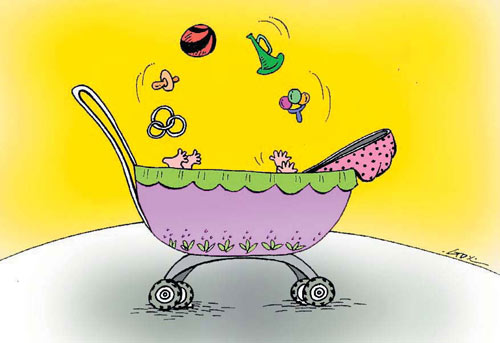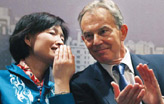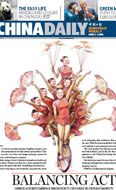An ancient art form that enthralls
Updated: 2011-04-01 10:22
By Yang Shuangyin (China Daily European Weekly)
Acrobatics, like many other art forms created by mankind such as music and painting, is one of the most ancient art forms.
 |
The origin of acrobatics is evolutionary. In the early times of human history, to survive and protect themselves against attacks and injuries from beasts, our ancestors had to learn to use tools and improve their strength and throwing skills. To pick the fruits high up on the trees, they had to learn to climb as well.
Since fights between various tribes were unavoidable, it was necessary for people to acquire a higher level of physical skill, or the skill of using force.
These skills, as basic survival abilities, were originally employed for daily needs.
But once these skills became something for showing off, not just for the purpose of survival, their role and nature would change and became activities for entertainment. The advent of entertainment activities indicates the emergence of acrobatics.
This deduction can be best supported by Chinese acrobatic performances nowadays. In Wuqiao, "the hometown of Chinese acrobatics", many acrobats still use props that evolved from labor tools in daily life.
In the relics of China's Han Dynasty (206 BC - AD 220), there were already some pictures portraying acrobatic performances. All this proves that before the Han Dynasty, acrobatics was well developed and extremely popular among the people.
In human history, the emergence of various art forms is the best witness of the development of human civilization and society. Just like music, dancing and painting, acrobatics is one of the few art forms that penetrate human activities. With a rich history, it still maintains vigor in our daily life.
Acrobatics, in a broad sense, usually contains performances that include magic, martial arts, dancing, music and other various art forms. It was not until when music, dancing and other art forms were fully developed, was acrobatics separated and became an independent kind of art form.
In a narrow sense, acrobatics indicates the performance that demonstrates the physical skills of human beings.
Whether in the Western world, or in Asia or Africa; whether in ancient times or in modern society, people share similar appreciation of acrobatics.
This shows that acrobatics can present people from different social sectors in different times with some common values.
Acrobatics is the direct expression of the beauty of human body. That is also the same characteristic acrobatics share with music.
Though not reflecting the real world in a direct way, as an art for the expression of thoughts, music is an indirect way of emotional communication and spiritual dialogue between the musician and the audience, so as to reach a common harmony.
On the other hand, acrobatics and music are also different. In addition to wonderful physical skills, acrobatics also embodies the process of reflection to the audience.
Acrobatics is a profound art form that deeply affects the audience with its performance. It demonstrates great meaning with simple physical activities.
Like the 100-meters dash in the Olympic Games, it is not only a simple body movement, but also a basic human survival skill. Such a common and simple activity reflects a great spirit, the Olympic spirit, because it includes the most vigorous and intrinsic nature of life.
Though acrobatics is not an Olympic event, but an art form, it still has similar elements and spirit with the Olympics, that is to challenge the limits of human body and advance toward the higher, harder and more dangerous.
Just like sports, what acrobatics shows is the human body and its potential. The difference is that it is not through competition but performances. A good acrobatic show can express expectations and experiences of life through its external performance directly.
All in all, emotions, life and the human body itself, reflect the significance of acrobatics. This is the vitality and also charm of acrobatics.
Acrobatics expresses different contents in different ways. People's desire for flying, for power and strength, their dreams of magical changes and other various wishes are the motives that drive artists to create more wonderful acrobatic performances.
In recent years, in the pursuit a higher level of acrobatic development, Chinese acrobats have integrated more artistic elements into acrobatics performances. They combine various art forms with acrobatics to explore a relatively clearer theme and form a more influential and appealing works of art.
The effort and attempts by the Chinese and world acrobats have injected new vitality to acrobatics, and achieved great success.
In the final analysis, the challenging of human limits is the nature and fundamental of acrobatics.
The author is head of the Cultural Relics Administrative Institute in Wuqiao, and co-author of Wuqiao Acrobatics.
E-paper

Green mission
Tony blair believes China will take a leading role to fight climate change and cut emissions.
The spring of new professions
Real modern times
F1 sponsors expect returns from Shanghai stop
Specials

Share your China stories!
Foreign readers are invited to share your China stories.

Have you any wool?
The new stars of Chinese animation are edging out old childhood icons like Mickey Mouse and Hello Kitty.

Fill dad's shoes
Daughter and son are beginning to take over the family business of making shoes.
